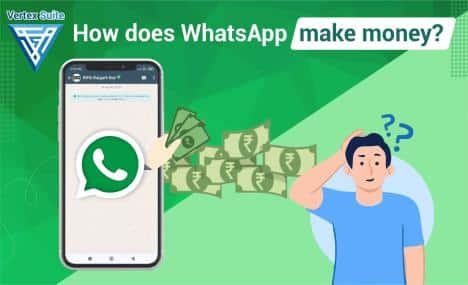WhatsApp, the ubiquitous messaging app boasting over 2 billion users worldwide, seems like a free lunch. We use it daily to connect with friends, family, and colleagues; send messages; share media; and even make calls, all without paying a dime. This raises the question: how does WhatsApp generate revenue?
While the answer might not be immediately obvious, WhatsApp has cleverly woven various revenue-generating strategies into its platform. Let’s unravel the mystery and explore the fascinating business model that keeps this messaging behemoth afloat.
WhatsApp Business API
One of the primary ways WhatsApp makes money is through its WhatsApp Business API. This service allows businesses to connect with their customers on a platform they already use and love. Companies can use the API to:
- Provide customer support: Respond to queries, resolve issues, and offer personalized assistance.
- Send important updates: Deliver order confirmations, shipping notifications, and appointment reminders.
- Share promotional messages: Run marketing campaigns, announce sales, and offer exclusive deals.
The WhatsApp business app
In addition to the API, WhatsApp offers a dedicated WhatsApp Business app. This free app provides small businesses with tools to manage their customer interactions effectively. Features like automated greetings, quick replies, and labels help streamline communication and enhance customer experience.
Click-to-WhatsApp Ads
Facebook, WhatsApp’s parent company, leverages its massive advertising network to generate revenue for the messaging app. How does WhatsApp make money through ads? WhatsApp generates revenue by providing “Click-to-WhatsApp” advertisements on Facebook and Instagram.
These ads allow businesses to include a “Send Message” button that instantly opens a WhatsApp chat with the company. This feature enables businesses to drive traffic to WhatsApp and engage with potential customers directly, making it a valuable lead generation tool. Facebook charges advertisers for these clicks, indirectly contributing to WhatsApp’s revenue stream.
WhatsApp Pay
Although still in its early stages in many countries, WhatsApp Pay is another avenue through which WhatsApp makes money. This integrated payment feature allows users to send and receive money directly within the app.
While WhatsApp doesn’t charge users for peer-to-peer payments, it generates revenue by charging businesses a small transaction fee for processing payments. As WhatsApp Pay gains wider adoption, it has the potential to become a significant revenue source.
Data Sharing
While privacy is a major concern, WhatsApp does share some user data with Facebook. Facebook uses this data sharing primarily for targeted advertising, involving information like phone numbers and device identifiers.
Partnerships and integrations
How does WhatsApp make money through partnerships? WhatsApp collaborates with diverse businesses and organizations to provide specialized services. For instance, WhatsApp has partnered with government agencies and healthcare providers to facilitate communication and disseminate vital information.
WhatsApp Status Ads
Similar to Instagram Stories, WhatsApp Status allows users to share temporary updates that disappear after 24 hours. WhatsApp has started to monetize this feature by displaying ads between Status updates.
Future monetization opportunities
As WhatsApp continues to evolve, new monetization opportunities are likely to emerge. Some potential avenues include:
- In-app purchases provide premium features such as custom themes, stickers, or advanced privacy settings for a fee.
- The subscription model introduces a premium tier that offers exclusive features and benefits, all for a recurring subscription fee.
- The gaming platform involves integrating games within the app and generating revenue through in-app purchases or advertising.
The power of network effects
One of the key factors contributing to WhatsApp’s success and monetization potential is the network effect. As more people use WhatsApp, its value proposition increases exponentially.This network effect creates a powerful ecosystem that attracts both users and businesses, making it an attractive platform for monetization.
Long-Term Vision
In the end, WhatsApp’s long-term vision intrinsically influences how it generates revenue. By focusing on user growth and engagement, WhatsApp aims to build a sustainable platform that can generate revenue through various avenues.
Conclusion
WhatsApp’s revenue model is a testament to its ability to balance user needs with business objectives. By offering a free and valuable service, WhatsApp has amassed a massive user base, creating a fertile ground for monetization. Through a combination of business services, advertising, payments, and strategic partnerships, WhatsApp has successfully built a sustainable and profitable business. As the platform continues to evolve, we can expect to see even more innovative monetization strategies that further solidify its position as a global communication leader.
FAQs
- Is WhatsApp really free? Yes, WhatsApp is free to download and use for basic messaging and calling features. However, businesses pay for using the WhatsApp Business API, and transaction fees apply for WhatsApp Pay.
- Does WhatsApp sell my data? WhatsApp does share some user data with Facebook for targeted advertising, but it does not sell your personal information to third parties.
- How does WhatsApp make money from Status? WhatsApp displays ads between Status updates, similar to Instagram Stories.
- Is the WhatsApp Business App free? Yes, the WhatsApp Business app is free to download and use, offering basic tools for managing customer interactions.
What is the future of WhatsApp monetization? Potential future revenue streams include in-app purchases, subscription models, and gaming platforms.






